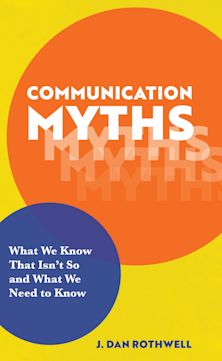- Home
- ACADEMIC
- Communication Studies
- Interpersonal Communication
- Understanding Everyday Incivility
This product is usually dispatched within 3 days
- Delivery and returns info
-
Free CA delivery on orders $40 or over
You must sign in to add this item to your wishlist. Please sign in or create an account
Description
Understanding Everyday Incivility delves into the day-to-day annoying behaviors that color our interactions with other people, such as the use of crude language in public, family members who claim that they’re “just teasing” and we’re “too sensitive,” coworkers who constantly interrupt us, and inflammatory remarks posted on social media sites.
Shelley D. Lane explores what is considered uncivil behavior, why we label some acts as crude or selfish while others are deemed polite and proper, and how these labels often change from one context to the next. She highlights the power dynamics at play in our interactions and explains how “rude” behavior can sometimes be beneficial—and “polite” behavior can be detrimental. Rather than a simplistic manual of manners, Lane provides the tools to understand everyday incivility and strategies for responding effectively and appropriately.
Table of Contents
Chapter 2: Characterizing Everyday Incivility
Chapter 3: Influences on Everyday Incivility
Chapter 4: The Good, the Bad, and the Virtue of Civility
Chapter 5: Power and Everyday Incivility
Chapter 6: Everyday Incivility at Work
Chapter 7: Everyday Incivility Online
Chapter 8: Everyday Incivility at Home
Chapter 9: Promoting Everyday Civility
Product details
| Published | Feb 06 2020 |
|---|---|
| Format | Paperback |
| Edition | 1st |
| Extent | 264 |
| ISBN | 9781538141205 |
| Imprint | Rowman & Littlefield |
| Illustrations | 2 tables; 9 textboxes |
| Dimensions | 230 x 153 mm |
| Publisher | Bloomsbury Publishing |
About the contributors
Reviews
-
The book does an excellent job of accommodating the non-academic reader. The examples inject vivid liveliness, the writing is a model of clarity and there is an impressive synthesis of a large body of research.
Discourse Studies
-
Shelley Lane frames a theoretical “why” for civility as she acknowledges increasing cases of incivility in the public domain. Her work outlines a basic presupposition: people must be heard, not dismissed by pejorative statements. She reclaims civility as a pragmatic democratic foundation in this historical moment.
Ronald C. Arnett, Duquesne University
-
When we encounter rude behavior, we instinctively blame impolite people. Drawing on academic research, personal stories, and newsworthy episodes, Shelley Lane cleverly demonstrates how incivility can emerge from cultural change, social contexts, and simple misunderstandings. This is a timely and thoughtful book that should bring us to pause and reflect before we rush to judgment.
Philip Smith, Yale University; coauthor of Incivility: The Rude Stranger in Everyday Life
-
Taking a perspective toward civility and incivility that emphasizes their contextual and communicative features, Shelley Lane identifies the complexity of the phenomenon and the importance of respect, restraint, and responsibility. Consistent with the "dark side" perspective of functional ambivalence, in which there is brightness in the dark and darkness in the light, Lane presents both a highly readable and practical contemplation of incivility, as well as a legitimate scholarly work of great analytic breadth and depth. In a time that so often feels of despair, Understanding Everyday Incivility actually offers much optimism that acceptable forms of civility can be achieved.
Brian H. Spitzberg, Senate Distinguished Professor of Communication, San Diego State University
-
Understanding Everyday Incivility offers a thorough, informed, and readable examination of the many forms that incivility can take and the various contexts in which it occurs. Lane’s numerous thought-provoking examples of behavior that might be labeled uncivil keep her analyses concrete and relevant to contemporary life. Her strategies for promoting civility are both sensible and timely.
Emrys Westacott, Alfred University; author of The Virtues of Our Vices: A Modest Defense of Gossip, Rudeness, and Other Bad Habits
-
This comprehensive, up-to-date treatment of the communicative vice of incivility and its virtuous counterpart, civility, is an invaluable resource for researchers, instructors, and practitioners alike. Both scholarly and refreshingly accessible, Lane’s impressive, carefully documented volume organizes the vast, multi-disciplinary body of research on everyday communicative practices that can harm or heal relational and organizational environments.
Janie Harden Fritz, Duquesne University; author of Professional Civility: Communicative Virtue at Work


































